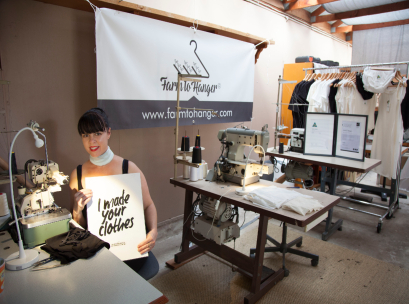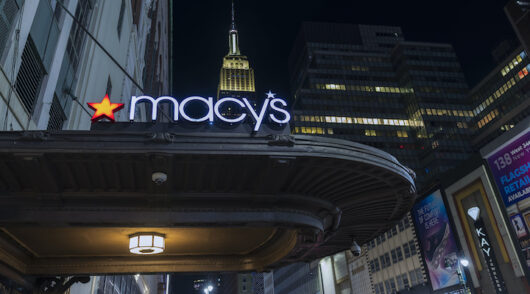 As an environmental photographer, Anna-Louise Howard was continually confronted with the effect that pollution had on the landscapes she captured. She started trying to raise awareness of the issue through public exhibitions, but although she could show people what was happening, she couldn’t change their behaviour. So Howard decided she needed to make a change herself.
As an environmental photographer, Anna-Louise Howard was continually confronted with the effect that pollution had on the landscapes she captured. She started trying to raise awareness of the issue through public exhibitions, but although she could show people what was happening, she couldn’t change their behaviour. So Howard decided she needed to make a change herself.
“When I looked at which industry was creating the most pollution, mining wasn’t a surprise, but fashion was,” Howard tells IRW. The 2017 report by the Ellen MacArthur Foundation, A New Textiles Economy: Redesigning Fashion’s Future, noted people are wearing new clothes fewer times before disposing of them, with more than half of fast-fashion products discarded within a year of purchase.
Of these products, less than 1 per cent of the materials used are recycled, leading to one garbage truck full of textiles landfilled or burned every second. Howard decided to create Farm to Hanger, an eco-fashion brand that was built as a sustainable, ethical business from the ground up.
She acknowledges that incumbent retailers may find it hard to adopt similar practices, since they have to reverse decades of momentum before any real gains can be made. However, when the scale of the problem is as large as the one threatened by climate change, the excuses start to feel a little thin, says Howard.
Farm to hanger
“I’d been around the fashion industry for many years, and I thought, ‘This is an industry I know about, and I can actually walk into that industry quite easily, as well as knowledgeably, to make a difference and create a brand that was combating all of those issues’,” Howard says.
The road to create a sustainable brand wasn’t easy, or quick, but Howard is on track to have founded Australia’s first 100 per cent sustainable apparel manufacturing facility.
“We’re already on green-power electricity. We’re off-grid on the water and septic. We’re now looking at the power choices. Obviously we’re going to solar, and we’ve looked at the Tesla Powerwall,”
Howard says, referring to battery technology that can be hooked up to solar panels to save the power captured for later use. “We’ve already paced out what we want to do, but now […] we’re actually looking at the size of the facility and what those requirements will be so that we future-proof the entire project.”
Howard remembers hearing a retailer stating it was too hard for them, and their suppliers, to make a transparent supply chain. “I just don’t believe that. I truly believe that if you make it a prerequisite to do business that it’s quite possible. You just have to dig, and ask questions, and you have to be really firm on saying yes or no to things based on that core belief – that it’s important,” she says.
A contentious issue
In recent years, the number of retailers touting the sustainability of their products has exponentially increased. There’s no longer any
doubt, sustainability is sexy. We’ve now seen the country’s largest supermarket chains begin the process of removing plastic bags from their checkouts: a decision that has caused much frustration and outcry as the public makes the shift from something that has become a habit to something that feels like a chore – bringing their own reusable bags from home or purchasing new ones at the register.
If the message on plastic were consistent, it would be hard to argue with, but due to the constant moving of the goal posts the initiatives have become an easy target for those who find fault with companies’ motives.
“It’s a contentious issue,” Howard says. “The whole plastic bag thing with Coles – and then to have their Little Shop come out. People are vocal on that, but they’re not changing their actions.”
Coles’ Little Shop campaign has been a success for the supermarket, although the promotion largely flies in the face of its commitment to cutting plastic. People decry the hypocrisy, but they still collect the little plastic toys.
The supermarkets’ efforts are sure to be shaken by the fact that both Coles and Woolworths suffered a drop in sales over the transition period during which the free, single-use plastic bags were phased out.
A cynical person would say the experience will lead more companies to commit acts of greenwashing: that is, using the sustainability craze as a marketing ploy without any intentions to actually change their processes.
This trend is evident in the fashion industry, where complex supply chains enable companies to make their business practices as green.
“It’s extremely difficult to educate the consumer to look deeper, and I think that there’s a lot of people who get content shock when I tell them there’s no Australian-grown organic cotton – it doesn’t exist,” says Howard.
“When I tell them […] all organic cotton products are made from imported cotton and not Australian grown, and that they have larger environmental impact than our fabrics […] they get really upset because they feel lied to. That’s happening more and more because [companies] are using it as a marketing tactic.”
Planting trees
While some larger businesses are dipping their toes in the water of a greener future, and some are watching with interest or indifference, there are others who are making a more concerted effort to make larger changes to their business model.
Officeworks’ Restoring Australia initiative, a two-for-one tree planting initiative which launched in August 2017, has gained the support of approximately 40 brands working with the company and has restored approximately 650 hectares of land that belongs to 31 landholders and farmers across Tasmania, NSW, Victoria and South Australia.
Next year the initiative will spread to locations in Queensland and Western Australia, and by year-end aims to have a total of 326,000 trees in the ground.
“It’s no easy feat,” Officeworks head of corporate affairs and brand Alexandra Staley said. “There are about 20 native tree and shrub species being planted in each project location, which will go a long way in increasing water quality and revegetating bushland so that local endangered wildlife can flourish.
“But, the program isn’t just about regenerating the natural landscapes, it’s also about providing benefits to the communities where the planting takes place.”
Staley notes the company has not provided single-use plastic bags since 2008, instead offering the option to purchase a five- or 10-cent kraft bag with proceeds donated to Planet Ark, and says that 90 per cent of Officeworks customers have chosen to go bag-free.
Though these achievements can seem large, it doesn’t have to begin that way.
“Start with the little things,” Howard advises. “The little things make a big difference long term. Start with getting rid of paper in the office, turn the printers off… Look at the way your kitchen is run, not having disposable cutlery or crockery. Turn the dishwasher off, or only use it once a day.”
These in-house practices chip away at the business’s culture, and begin to have a ripple effect on your staff, who in turn may change
their practices at home, said Howard. “That’s how you honestly make a bigger impact than just your little business, or just your big business.”





